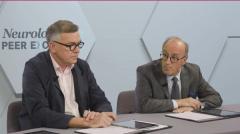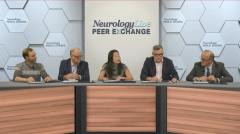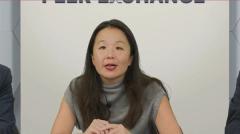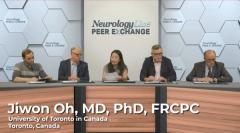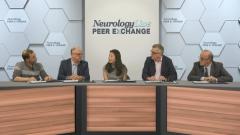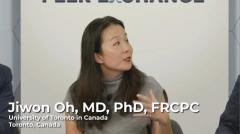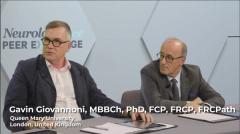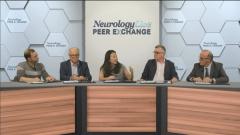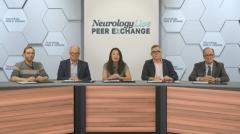
Phase II Clinical Trial: Fenebrutinib
Amit Bar-Or, MD, FRCPC, summarizes fenebrutinib phase II results for the treatment of multiple sclerosis.
Episodes in this series

Jiwon Oh, MD, PhD, FRCPC: Moving on to the different BTK inhibitors with phase 2 clinical trial data, a recent trial recently reported results on the phase 2 clinical trial. Would you mind summarizing what the study looked like and what the results were?
Amit Bar-Or, MD, FRCPC: Sure, yes. This is the phase 2 fenebrutinib trial. The primary outcome was the ability to decrease the development of new gadolinium-enhancing lesions over a 12-week period. It was a pretty short study. This was a 2-to-1 randomization vs placebo, and the primary outcome measure was met quite substantially with a reduction seen as early as 4 weeks after the initiation and 90% decrease by week 8 sustained at week 12.
The other very interesting thing that was incorporated into this study was a CSF sub-study, a serial cerebrospinal fluid study, to assess the concentration of whether fenebrutinib accessed the central nervous system or not. The inhibitory concentrations that were achieved were such and assessed not just at the level of limiting the BTK itself, but a more functional outcome was assessed both for B cells and myeloid cells the capacity to upregulate activation molecules and the ability of fenebrutinib to decrease that.
Essentially, in the cohort of CSF studies analyzed and patients analyzed, all patients achieved well above the IC50 for both the B cell and myeloid cell inhibition of activation. In 4 individuals, there was tandem CSF and serum to assess, so one could ask about the concentration and the relative ratio of CSF to serum.
In those 4 cases, 1 achieved a ratio that would be viewed as quite favorable, indicating access of the fenebrutinib into the CSF compartment at concentrations that would be expected to meaningfully inhibit both B cells and myeloid cells.
Gavin Giovannoni, MBBCh, PhD, FCP, FRCP, FRCPath: The fenebrutinib CSF study is really interesting, isn't it? The fenebrutinib CSF data is really interesting because it's the one compound that's not a covalent inhibitor. Do you think it makes any difference if it's non-covalent or covalent?
Amit Bar-Or, MD, FRCPC: It's hard to know, and I think as Gil indicated, at the end of the day, these are theoretical considerations, potential differences between molecules, and it is indeed the only one that stands out. How significant that is boils down, probably, to the physical, chemical properties of the binding and the consequences of the binding.
One thing to keep in mind is that BTK is made constantly and so blocking its action, you know, the available molecules there are others that are being expressed generated and will be available biologically, so how important the reversibility and how important the covalent bonding, which of course is a strong bonding, is not entirely clear. There are theoretical reasons to think that it may contribute to faster offset of action which may be important if there's an adverse event and you want to be able to see the drug out of the system more quickly. We'll have to see what the phase 3 program shows in terms of safety.
Gavin Giovannoni, MBBCh, PhD, FCP, FRCP, FRCPath: I suppose as a class that's one of the advantages; they're not really depleters. They may change the population over time, but you'll have your B cell compartment relatively intact for if you have an adverse event like an infection or something like that. Reversibility quite quickly should be an advantage over these anti-CD20s.
Jiwon Oh, MD, PhD, FRCPC: I agree. I think the reversibility piece is pretty reassuring regardless of whether it's actually reversible or irreversible because the enzymes are constantly replaced, and so I think the issue that we have with the B cell depleters will not be as much of a problem for the BTKis.
Gavin Giovannoni, MBBCh, PhD, FCP, FRCP, FRCPath: One of the things that's emerging in the oncology space is that you develop mutant BTKs. Obviously, you select for mutations, and you often get resistance to our roots, and then you move on to the second and third generation ones. Do you think this is an issue that'll happen in MS?
Amit Bar-Or, MD, FRCPC: I'd expect biologically it may, but I would predict that it won't be a big problem in terms of losing efficacy as one sees in the context of cancer. The B-cells in MS, of course, are not cancerous B-cells proliferating at a very high rate and mutating at a high rate, so the risk of losing efficacy on that basis, I think, is relatively low with normal B-cells.
You made the comment about memory B-cells being perhaps particularly susceptible, and while I think it's correct to consider BTK inhibitors as non-depleting, it is also likely that over time there may be some loss of some subsets, quite potentially an advantage in the context of MS. What we still don't really know is what the consequences of long-term inhibition of BTK would be over 5 years, 10 years, et cetera.
Gavin Giovannoni, MBBCh, PhD, FCP, FRCP, FRCPath: In the oncology space, there are people on ibrutinib and acalabrutinib a long time.
Amit Bar-Or, MD, FRCPC: CLL is a good example of people being on ibrutinib and acalabrutinib for a long time. I think it's generally going to be viewed as safe and well tolerated, but it won't be entirely; it won't be leaving the B-cell repertoire entirely intact. It will probably result in changes that are relatively modest or mild and certainly not depleting as one sees with the B-cell depleting agents.
It's important to make the point that B-cell depleting agents are not depleting all B-cells. They're depleting them in the circulation, but the circulation has only 2% of our immune cells, and many B-cells are likely to be staying within tissues, even in the face of what we consider to be complete peripheral depletion.
Gavin Giovannoni, MBBCh, PhD, FCP, FRCP, FRCPath: Sticking on the mode of action, the evobrutinib vaccine trial, which you were the first author, was surprising because even though you're inhibiting BTK, you're not suppressing B-cell responses completely, which is very different to what we see with anti-CD20 therapy. There is a difference between the 2 in terms of their level of B-cell inhibition.
Krzysztof Selmaj, MD, PhD: I think some data on how strong BTK inhibition is coming from the pharmacodynamic studies in individuals. I think this study showed that tenebrutinib, for example, is going to be a short time to inhibit BTK within 1.5 hours and how much it would translate to the clinical efficacy and the clinical use, what you really need to wait for the further studies, of course.
TRANSCRIPT EDITED FOR CLARITY
Newsletter
Keep your finger on the pulse of neurology—subscribe to NeurologyLive for expert interviews, new data, and breakthrough treatment updates.

